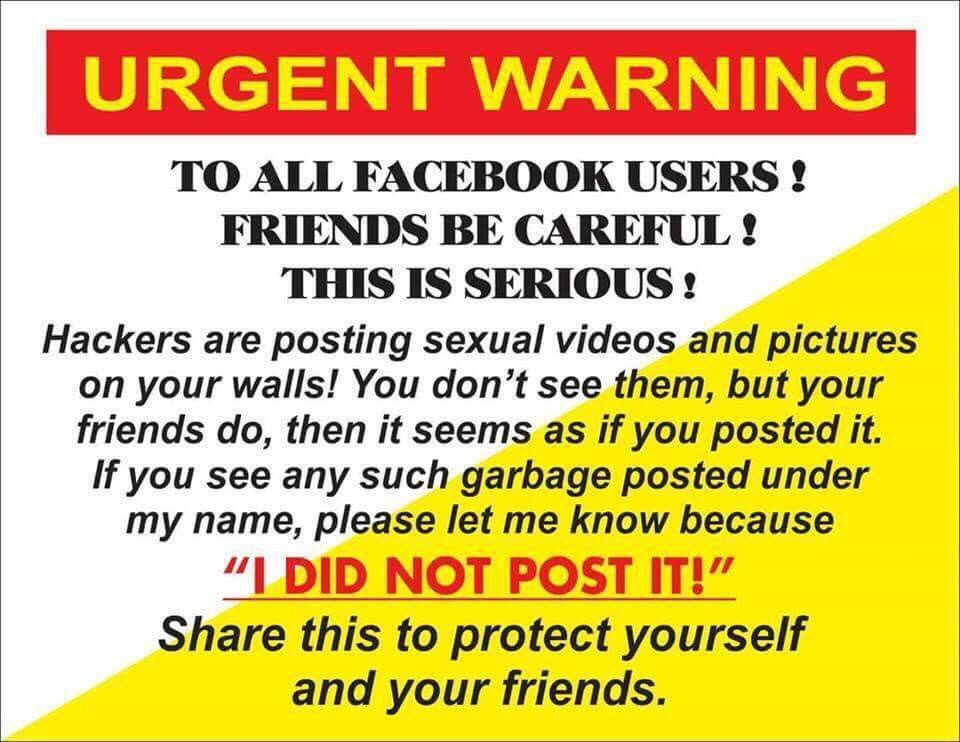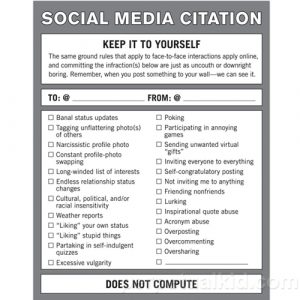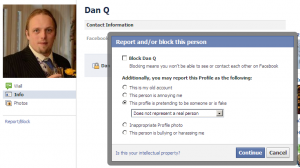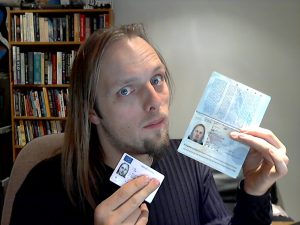And while we’re talking about AI.
It took a disproportionate about of time to find the right (tiny) link, but eventually I managed to opt-out of my content being used to train Facebook’s AI. They don’t make it easy, do they?
And while we’re talking about AI.
It took a disproportionate about of time to find the right (tiny) link, but eventually I managed to opt-out of my content being used to train Facebook’s AI. They don’t make it easy, do they?
Meta are launching Threads tomorrow.
If you’re wondering how this will impact the world and society’s social connections, I direct you to the predictive powers of 1984 British cinema.
This is a reply to a post published elsewhere. Its content might be duplicated as a traditional comment at the original source.
Great advice.
After I got banned from Facebook in 2011 (for using a “fake name”, which is actually my real name) I took a similar line of thinking: I can’t trust Facebook (or Twitter, or Instagram, or whoever else) to be responsible custodians of my content, so I shan’t. Now, virtually all content I create is hosted on my WordPress-powered blog, at my own domain, first and foremost… and syndicated copies may appear on various social media.
In a very few instances I go the other way around, producing content in silos and then copying it back to my blog: e.g. my geocaching/geohashing expeditions are posted first to their respective sites (because it’s easiest and most-practical to do that using their apps, especially “in the field”), but then they get imported into my blog using a custom plugin. If any of these sites closes, deletes my data, adds paid tiers I’m not happy with, or just bans me from my own account… I’m still set.
Backing up all your social content is a good strategy. Owning it all to begin with is an even better one, IMHO. See also: Indieweb.

In the remote chance that @Facebook‘s #LibraCoin [Wikipedia] takes off, I suggest that the appropriate slang term for the currency shall be zucks.
As in: “I’ll bet you a hundred zucks that this new #cryptocurrency will be barely more-successful than Dogecoin, and far less-cute.”
This is a repost promoting content originally published elsewhere. See more things Dan's reposted.
Mark Zuckerberg says regulators and governments should play a more active role in controlling internet content.
In an op-ed published in the Washington Post, Facebook’s chief says the responsibility for monitoring harmful content is too great for firms alone.
He calls for new laws in four areas: “Harmful content, election integrity, privacy and data portability.”
It comes two weeks after a gunman used the site to livestream his attack on a mosque in Christchurch, New Zealand.
“Lawmakers often tell me we have too much power over speech, and frankly I agree,” Mr Zuckerberg writes, adding that Facebook was “creating an independent body so people can appeal our decisions” about what is posted and what is taken down.
…
An interesting move which puts Zuckerberg in a parallel position to Bruce Schneier, who’s recently (and especially in his latest book) stood in opposition to a significant number of computer security experts (many of whom are of the “crypto-anarchist” school of thought) also pushed for greater regulation on the Internet. My concern with both figureheads’ proposals comes from the inevitable difficulty in enforcing Internet-wide laws: given that many countries simply won’t enact, or won’t effectively enforce, legislation of the types that either Zuckerberg nor Schneier suggest, either (a) companies intending to engage in unethical behaviour will move to – and profit in – those countries, as we already see with identity thieves in Nigeria, hackers in Russia, and patent infringers in China… or else (b) countries that do agree on a common framework will be forced to curtail Internet communications with those countries, leading to a fragmented and ultimately less-free Internet.
Neither option is good, but I still back these proposals in principle. After all: we don’t enact other internationally-relevant laws (like the GDPR, for example) because we expect to achieve 100% compliance across the globe – we do so because they’re the right thing to do to protect individuals and economies from harm. Little by little, Internet legislation in general (possibly ignoring things like the frankly silly EU cookie regulation and parts of the controversial new EU directives on copyright) makes the Internet a safer place for citizens of Western countries. There are still a huge number of foreign threats like scammers and malware authors as as well as domestic lawbreakers, but increasing the accountability of large companies is, at this point, a far bigger concern.
This is a repost promoting content originally published elsewhere. See more things Dan's reposted.
Desperate for data on its competitors, Facebook has been secretly paying people to install a “Facebook Research” VPN that lets the company suck in all of a user’s phone and web activity, similar to Facebook’s Onavo Protect app that Apple banned in June and that was removed i…
…
Since 2016, Facebook has been paying users ages 13 to 35 up to $20 per month plus referral fees to sell their privacy by installing the iOS or Android “Facebook Research” app. Facebook even asked users to screenshot their Amazon order history page. The program is administered through beta testing services Applause, BetaBound and uTest to cloak Facebook’s involvement, and is referred to in some documentation as “Project Atlas” — a fitting name for Facebook’s effort to map new trends and rivals around the globe.
…
I figured we’d been almost a day since Facebook were last in the news for privacy and ethics-related concerns (earlier this week, earlier still), so we must’ve been due more coverage. This time, it’s about Facebook’s latest tack in trying to understand the teen market that it’s failing to penetrate as well as it once did, and the fact that it’s been paying young adults and children to proxy all of their traffic through Facebook’s servers including setting up their phones to allow Facebook to break their encryption so that it can understand how they’re using them.
This is a repost promoting content originally published elsewhere. See more things Dan's reposted.
Facebook plans to integrate its messaging services on Instagram, WhatsApp and Facebook Messenger.
While all three will remain stand-alone apps, at a much deeper level they will be linked so messages can travel between the different services.
Facebook told the BBC it was at the start of a “long process”.
The plan was first reported in the New York Times and is believed to be a personal project of Facebook founder Mark Zuckerberg.
Once complete, the merger would mean that a Facebook user could communicate directly with someone who only has a WhatsApp account. This is currently impossible as the applications have no common core.
The work to merge the three elements has already begun, reported the NYT, and is expected to be completed by the end of 2019 or early next year.
…
Facebook-looking-dodgy in the news again this week (previously) with the news that they plan to integrate Instagram and WhatsApp into their central platform. They’re selling the upsides of this, such as that Facebook and WhatsApp users will be able to communicate with one another without switching to a different tool, but privacy advocates are understandably concerned: compared to Facebook, WhatsApp provides a reasonable level of anonymity. It also seems likely that this move may be an effort to preempt antitrust suits forcing Facebook’s property portfolio to be kept separate.
But even without those concerns, there are smaller but just-as-real, more-insidious privacy risks from this integration. With a very minor change to their terms and conditions about the use of the WhatsApp app Facebook can start performing even more-sophisticated big-data mining on the types of interpersonal relationships that they’re known to enjoy (let’s not forget that this is the company whose app will, left-unchecked, mine your mobile phone book to find friends-in-common that you have with other people, even if that friend-in-common doesn’t use Facebook!). With WhatsApp’s treasure trove of metadata, Facebook can determine who you talk to and, from where, and with what frequency: by technical necessity, none of this metadata is protected by WhatsApp’s end-to-end encryption. Similarly, they can determine what “groups” you participate in. This easily supports the “shadow profiles” they maintain which tell them far more about your life and interests than your mere Facebook profile alone does.
I for one will be watching WhatsApp with care and dropping it if it looks likely to “turn evil”. It’s not as though there aren’t (arguably better) alternatives, such as Signal (which I already use as my primary mobile text messaging system) and Riot.
This is a repost promoting content originally published elsewhere. See more things Dan's reposted.
Internal documents appear to show that Facebook knew it was defrauding children and families through its ecosystem of online games as early as 2011. Employees even had a name for the practice, which they dubbed “friendly fraud,” or FF for short. More damning, related documents show that Facebook employees had found a way to stop the fraud from happening, but the social media giant prioritized revenue instead.
…
Unshocker as internal memo at Facebook shows that they not only knew that kids were taking advantage of their parents’ credit card details being retained by Facebook-hosted freemium games to allow them to continue to make purchases, but that they specifically instructed their developers to make it as easy as possible for people to fall into this trap. Common industry practices like requiring selected card digits for additional purchases were not implemented specifically to help ensure that kids could more-easily go wild with their parents’ bank accounts.
This is a repost promoting content originally published elsewhere. See more things Dan's reposted.
As somebody who likes to keep his content on his own server (y’know: right here!) but whose readers sometimes prefer that it’s syndicated to e.g. Facebook (as it is), I appreciate this comic by The Oatmeal.
This is a repost promoting content originally published elsewhere. See more things Dan's reposted.
Before the year 2014, there were many people using Google, Facebook, and Amazon. Today, there are still many people using services from those three tech giants (respectively, GOOG, FB, AMZN). Not much has changed, and quite literally the user interface and features on those sites has remained mostly untouched. However, the underlying dynamics of power on the Web have drastically changed, and those three companies are at the center of a fundamental transformation of the Web.
It looks like nothing changed since 2014, but GOOG and FB now have direct influence over 70%+ of internet traffic.
Internet activity itself hasn’t slowed down. It maintains a steady growth, both in amount of users and amount of websites…
This link was originally posted to /r/UnnecessaryQuotes. See
more things from Dan's Reddit account.
The original link was: http://i.imgur.com/LqvWPFQ.jpg

I see that Facebook is experimenting with allowing you to pay a nominal fee to make sure that your posts end up “highlighted” over those of your friends’ other friends. That’s a whole new level of crazy… or is it?

I’m not on Facebook, but I think that this is a really interesting piece of news. The biggest thing that makes Facebook unusable (and which also affects Twitter) is that people will post every little banal thing that comes to their mind. I don’t care what you’re eating for your lunch. I don’t want to read the lyrics of some song that must have been written for you. I really can’t stand your chain messages (for a while there, after I hadn’t received any by email for a few years, I hoped that they’d died out… but it turns out that they just moved to Facebook instead). If you’re among my friends, I know that you have some pretty smart and interesting things to say… but unless I’m willing to spend hours sifting through the detritus it’s buried in, I’ll never find it.

But this might work. If the price sweet spot can be found, and it’s marketed right, then this kind of feature might make services like Facebook more tolerable. When you’re writing about a cute picture of the cat you’ve seen, that’s fine. And when you write something I might care about, you can tick the “this is actually relevant” box. You’ll have to pay a few pence, but at least you know I’ll see it. And if I want to churn through reams of “X likes Chocolate” (who doesn’t?) and “Y is… in a queue for the bus” then I can turn off the “only relevant things” mode and waste some time.
The problem is that the sweet spot will vary from person to person, and there’s no way to work around that. Big Bucks Bob can probably afford to pay a couple of pounds every time he wants to push some meme photo to the top of your feed, but Poor Penniless Penny can’t even justify ten pence to make sure that all of her friends hear about her birthday party.

It’s a pity that it won’t work, because a part of me is drawn to the idea that economic theory can help to improve the signal-to-noise ratio in our information-saturated lives. Turning my attention to email: of all the cost-based anti-spam systems, I was always quite impressed with Hashcash (which Microsoft seem to be reinventing with their Penny Black project). The idea is that your computer does some hard-to-do (but easy-to-verify) computational work for each and every email that it sends. But in its own way, Hashcash has a similar problem to Facebook’s new system: the ability to pay of a sender is not directly proportional to their relevance to the recipient. If my mother wants to send me an email from her aging smartphone, should she have to wait for several minutes while it processes and generates an “e-stamp”, just because – if it were made any faster – spammers with zombie networks of computers could do so too easily?
Yes, I just equated your social network status, about what you ate for your lunch, with spam. If you don’t like it, don’t share this blog post with your friends.
hashcash token: 1:20:120511:https://danq.me/2012/05/11/pay-to-post/::UVHo081pj6bSDWkI:00000000000001sxI
Well, that was a farce.
tl;dr: [skip to the end] I’m closing my Facebook account. I’ve got some suggestions at the bottom of this post about how you might like to keep in touch with me in future, if you previously liked to do so via Facebook.
The Backstory
A little over three weeks ago, I was banned from Facebook for having a fake name. This surprised me, because I was using my real name – it’s an unusual name, but it’s mine. I was interested to discover that Claire, who shares my name, hadn’t been similarly banned, so it seems that this wasn’t part of some “sweep” for people with one-letter names, but instead was probably the result of somebody (some stranger, I’d like to hope) clicking the “Report this as a fake name” link on my profile.

There are many, many things about this that are alarming, but the biggest is the “block first; ask questions later” attitude. I wasn’t once emailed to warn me that I would be banned. Hell: I wasn’t even emailed to tell me that I had been banned. It took until I tried to log in before I found out at all.
The Problem
I don’t make much use of Facebook, really. I cross-post my blog posts there, and I keep Pidgin signed in to Facebook Chat in case anybody’s looking for me. Oh, and I stalk people from my past, but that’s just about the only thing I do on it that everybody does on it. I don’t really wallpost, I avoid internal messages (replying to them, where possible, by email), and I certainly don’t play fucking FarmVille.

So what’s the problem? It’s not like I’d be missing anything if I barely use it anyway? The problem is that my account was still there, it’s just that I didn’t have access to it.
That meant that people still invited me to things and sent me messages. My friends are smart enough to know that I won’t see anything they write on their wall, but they assume that if they update the information of a party they’ve Facebook-invited me to that I’ll get it. For example, I was recently at a fabulous party at Gareth and Penny‘s which they organised mostly via Facebook. They’d be forgiven for assuming that when they sent a message to “the guests” – a list that included me – that I would get that message: but no – it fell silently away into Facebook’s black hole.
The Farce(book?)
Following this discovery, here’s how I spent the next three weeks:

Hi Dan,
Thanks for verifying your identity. Note that we permanently deleted your attached ID from our servers.
After investigating this further, it looks like we suspended your account by mistake. I’m so sorry for the inconvenience. You should now be able to log in. If you have any issues getting back into your account, please let me know.
Thanks,
Aoife
User Operations
The Resolution
So now, I’m back on Facebook, and I’ve learned something: having a Facebook account that you can’t log in to is worse than not having a Facebook account at all. If I didn’t have one at all, at least people would know that they couldn’t contact me that way. In my situation, Facebook were effectively lying to my friends: telling them “Yeah, sure: we’ll pass on your message to Dan!” and then not doing so. It’s a little bit like digital identity theft, and it’s at least a little alarming.
I’ve learned something else, too: Facebook can’t be trusted to handle this kind of situation properly. Anybody could end up in my situation. Those of you with unusual (real) names, or unusual-looking pseudonyms, or who use fake names on Facebook (and I know that there are at least a dozen of you on my friends list)… or just those of you whose name looks a little bit off to a Facebook employee… you’re all at risk of this kind of lockout.
Me? I was a little pissed off, but it wasn’t the end of the world. But I know people who use Facebook’s “single sign-on” authentication systems to log in to other services. I know people who do some or all of their business through Facebook. Increasingly, I’ve seen people store their telephone or email address books primarily on Facebook. What do you do when you lose access to this and can’t get it back? When there’s nowhere to appeal?
And that’s how I came to my third lesson: I can’t rely on Facebook not to make this kind of fuck-up again. No explanation was given as to how their “mistake” was made, so I can’t trust that whatever human or automated system was at fault won’t just do the same damn dumb thing tomorrow to me or to somebody I know. And personally, I don’t like Facebook to seize control of my account and to pretend to be me. I come full circle to my first realisation – that it would be better not to have a Facebook account at all than to have one that I can’t access – and realise that because that’s liable to happen again at any time, that I shouldn’t have a Facebook account.
So, I’m ditching Facebook.

None of this pansy “deactivation” shit, either – do you know what that actually does, by the way? It just hides your wall and stops new people from friending you: it still keeps all of your information, because it’s basically a scam to try to keep your data while making you think you’ve left. No, I’m talking about the real “permanent deletion” deal.
I’m going to hang around for a few days to make sure I’ve harvested everybody’s email addresses and pushing this post to my wall and whatnot, and then I’m gone.
If you’re among those folks who aren’t sure how to function outside of Facebook, but still want to keep in touch with me, here’s what you need to know:
Ironically, the only Facebook accounts I’ll have now are the once which do have fake names. Funny how they’re the ones that never seem to get banned.
This self-post was originally posted to /r/self. See more things from Dan's Reddit account.
I have an unusual name: I’m pretty sure I’m the only person with my name in the world. It’s not the quirkiest name in the world – I have two names, the first one is pretty common, the second one is unusual but isn’t a swearword or “Elephanthead” or something, it’s all in the Latin alphabet, etc. – but it is a little strange.
Three weeks ago, Facebook blocked me from logging in. I wouldn’t have noticed except that my phone failed to log in to Facebook Chat, and told me that I needed to log in on facebook.com first. When I logged in, I was shown a form that stated that “Facebook is a community where people use their real names,” and that I had to “Supply my real name, as it appears on government-issued ID.” So I did.
Then it asked me to upload a photo of said ID, so I did.
After a week, Facebook emailed me to remind me of their real names policy and asked me to tell them my real name and to send them proof, as before. So I did so. This time I sent not only my driving license but also my passport.
Another week goes by, and they email me again with exactly the same text. I email back, asking if they actually read my last email at all. This time I provided photos of my passport, driving license, and carefully-censored pictures of my bank card, work ID, college ID, medical insurance card, etc.
Another few days go by, and they send me the exact same email again, asking for the same information yet again. I’ve tried to contact them by email and through their help system to ask how long this is going to take, and whether a human being is ever going to actually read my emails, but haven’t heard anything back.
I wouldn’t care, if I could at least delete my account: but I can’t, because I can’t log in to do so. They’re holding my data captive. My account still “looks” like it’s fine, so my friends try to contact me, invite me to things, etc., and I never hear about it. It’s a good job that I don’t use Facebook to log in to anything (that I’m aware of), or else I probably wouldn’t be able to use that too.
What do I do, Reddit? Is there some trick to actually getting Facebook to listen to you, or at least some way to delete your account without being permitted to log in to it?
tl;dr I’m banned from Facebook for using a fake name, but I’m not using a fake name. They’ve asked me to prove it, and I have (three weeks ago), but they just keep replying to ask me to prove it again.
Edit (screenshots): the screen I first saw when trying to log in after submitting their form, the screen I now see when trying to log in, and an example of an email I’ve received from them (I’ve got several of these, now, each signed off with a different name).